Victory in Europe Day
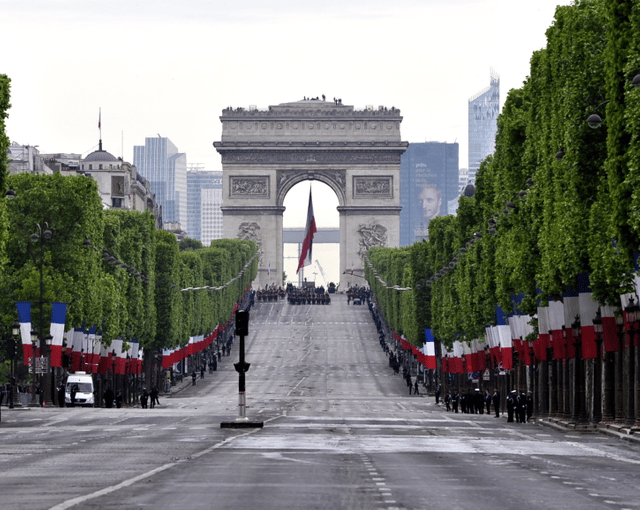
Victory in Europe Day

| Victory in Europe Day | |
|---|---|
| Also called |
|
| Observed by | European states (see below) |
| Significance | End of World War II in Europe |
| Date | 8 or 9 May 1945 |
| Related to | Victory over Japan Day, Victory Day |
Victory in Europe Day, generally known as VE Day (Great Britain) or V-E Day (North America), is a day celebrating the formal acceptance by the Allies of World War II of Nazi Germany's unconditional surrender of its armed forces on the 8 May 1945.
On 30 April 1945, Adolf Hitler, the Nazi leader, committed suicide during the Battle of Berlin. Germany's surrender, therefore, was authorised by his successor, Reichspräsident Karl Dönitz. The administration headed by Dönitz was known as the Flensburg Government. The act of military surrender was first signed at 02:41 on 7 May in SHAEF HQ at Reims,[1] and a slightly modified document was signed on 8 May in Berlin.
Most European countries celebrate the end of World War II on 8 May. Russia, Belarus, and Serbia celebrate on 9 May, as did several former Soviet bloc countries until after the fall of Communism and the break-up of the Soviet Union. Israel marks VE Day on 9 May as well as a result of the large number of immigrants from the former Soviet bloc, although it is not a public holiday. The term VE Day existed as early as September 1944,[2] in anticipation of victory.
| Victory in Europe Day | |
|---|---|
| Also called |
|
| Observed by | European states (see below) |
| Significance | End of World War II in Europe |
| Date | 8 or 9 May 1945 |
| Related to | Victory over Japan Day, Victory Day |
Celebrations
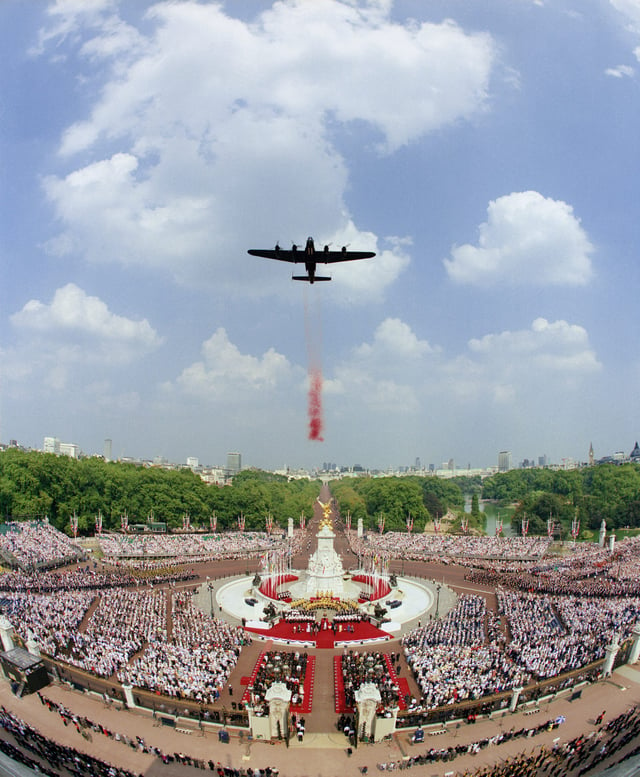
Britain remembers the 50th anniversary in 1995 with a Lancaster bomber dropping poppies in front of Buckingham Palace
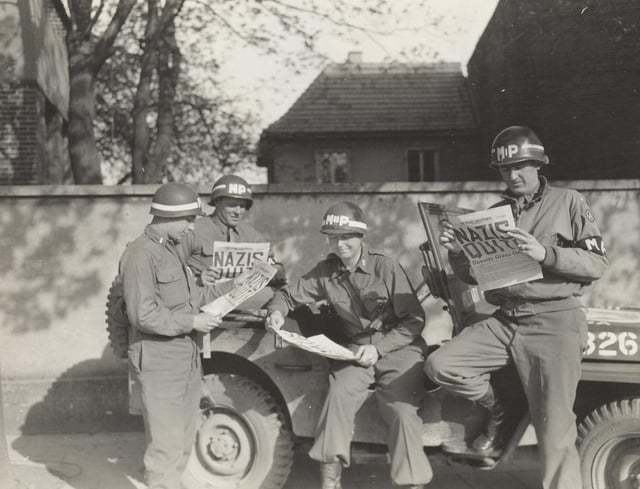
United States military policemen reading about the German surrender in the newspaper Stars and Stripes
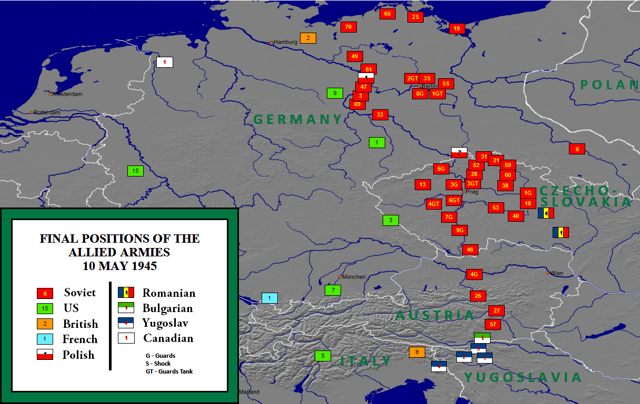
Final positions of the Allied armies, May 1945.
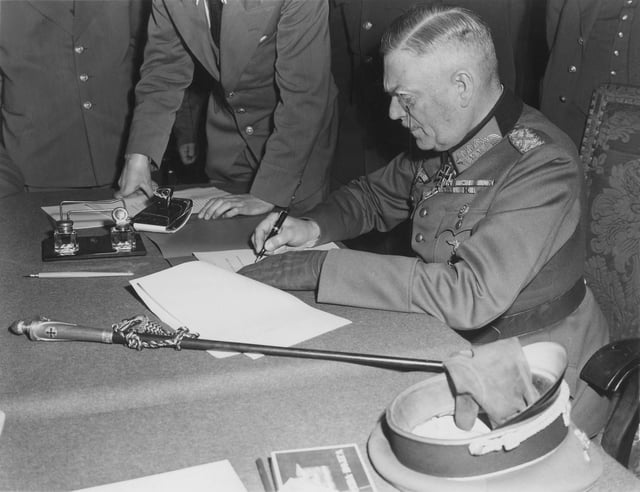
Field Marshal Wilhelm Keitel signing the final surrender terms on 8 May 1945 in Berlin
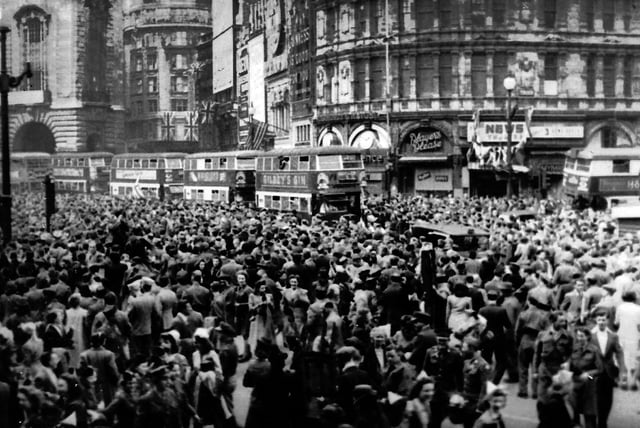
Crowds gathering in celebration at Piccadilly Circus, London during VE Day in 1945
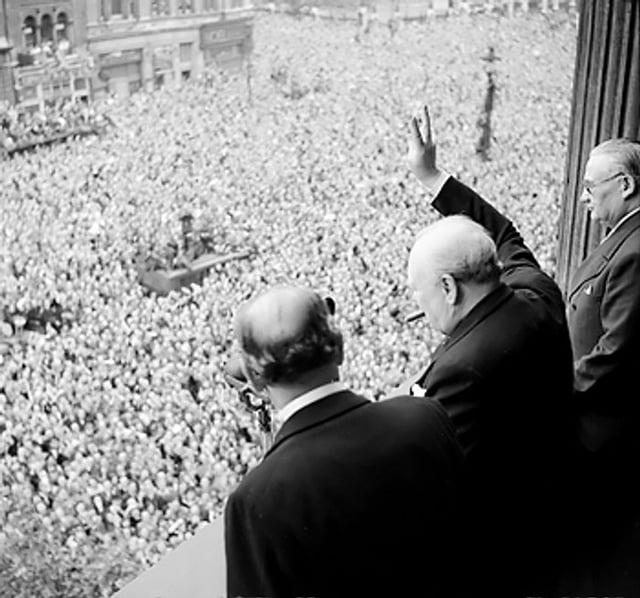
Winston Churchill waving to crowds in Whitehall, London on the day he confirms that the war with Germany was over
Upon the defeat of Germany, celebrations erupted throughout the western world, especially in Great Britain and North America. More than one million people celebrated in the streets throughout Great Britain to mark the end of the European part of the war. In London, crowds massed in Trafalgar Square and up the Mall to Buckingham Palace, where King George VI and Queen Elizabeth, accompanied by Prime Minister Winston Churchill, appeared on the balcony of the palace before the cheering crowds. Princess Elizabeth (the future Queen Elizabeth II) and her sister Princess Margaret were allowed to wander incognito among the crowds and take part in the celebrations.[3][4]
In the United States, the victory happened on President Harry Truman's 61st birthday.[5] He dedicated the victory to the memory of his predecessor, Franklin D. Roosevelt, who had died of a cerebral hemorrhage less than a month earlier, on 12 April.[6] Flags remained at half-staff for the remainder of the 30-day mourning period.[7][8] Truman said of dedicating the victory to Roosevelt's memory and keeping the flags at half-staff that his only wish was "that Franklin D. Roosevelt had lived to witness this day".[6] Later that day, Truman said that the victory made it his most enjoyable birthday.[5] Massive celebrations took place in many American cities, especially in New York's Times Square.[9]
Tempering the jubilation somewhat, both Churchill and Truman pointed out that the war against Japan had not yet been won. In his radio broadcast at 15:00 on the 8th, Churchill told the British people that: "We may allow ourselves a brief period of rejoicing (as Japan) remains unsubdued".[10] In America, Truman broadcast at 09:00 and said it was "a victory only half won".[11]
Soviet Victory Day
The instrument of surrender signed 7 May 1945 stipulated that all hostilities had to stop at 23:01 (CET), 8 May 1945, just an hour before midnight. Since it was already 9 May in the European part of the USSR, most post-Soviet states, including Russia celebrated Victory Day on 9 May. Since the end of Communism, all former Soviet bloc countries in Europe except Russia, Belarus, Ukraine, and Serbia have shifted to celebrate 8 May as the end of World War II, in line with the 7 May 1945 unconditional surrender document that Soviet and Russian leaders refused to recognise.
Commemorative public holidays
(May 8 unless otherwise stated)
Italy (25 April) "Festa della Liberazione" (Liberation Holiday).
Denmark (4 May) as "Befrielsen" (The Liberation)
Netherlands (5 May) as "Bevrijdingsdag" (Liberation Day)
United Kingdom: In 1995 the May Day bank holiday was moved from the first Monday in May, 1 May, to Monday 8 May, for that year only, to commemorate the 50th anniversary of the ending of the Second World War. For the 75th anniversary in 2020, the bank holiday will move from Monday, 4 May to Friday, 8 May.[12]
East Germany as Tag der Befreiung (Day of Liberation), a public holiday from 1950 to 1966 and in 1985. Between 1975 and 1990, as Tag des Sieges (Victory Day (9 May)).
France as Victoire 1945. Orléans simultaneously celebrates both V-E Day and the anniversary of the Siege of Orléans being lifted by French forces led by Joan of Arc during the Hundred Years War on this date.
Slovakia as Deň víťazstva nad fašizmom (Victory over Fascism Day)[13]
Czech Republic as Den vítězství (Day of Victory) or Den osvobození (Day of Liberation)
Poland as "Narodowy Dzień Zwycięstwa" – National Victory Day.
Norway as "Frigjøringsdagen" (Liberation Day) "offisiell flaggdag" (official flag day) not "helligdager" (public holiday)
Ukraine "День пам'яті та примирення" (Memorial Day)[14]
Ukraine (9 May) "День перемоги над нацизмом у Другій світовій війні" (Victory Day over Nazism in World War II) — from 2015.[15]
Georgia (9 May) "ფაშიზმზე გამარჯვების დღე" (Victory over Fascism Day)
Belarus (9 May) "Дзень Перамогі" (Victory Day)
Bosnia and Herzegovina (9 May) "Дан побједе", "Dan pobjede" (Victory Day)
Russia (9 May) "День Победы" (Victory Day)
Israel (9 May) Victory in Europe Day (Israel)
Ex-Yugoslavia (9 May) "Дан победе", "Dan pobede", "Dan pobjede", "Dan zmage" (Victory Day)
Uzbekistan (9 May) as "Галаба куни" or "День победы" (Victory Day). Since 1999 as "Xotira va Qadrlash Kuni" (День Памяти и Почестей)[16]
Kazakhstan (9 May) as "Жеңіс күні" or "День победы" (Victory Day)[17]
British Channel Islands Liberation Days: Jersey and Guernsey (9 May), Sark (10 May) and Alderney (16 May).
See also
Time of remembrance and reconciliation
Victory over Japan Day
Stunde Null
Victory in Europe Day (Israel)
